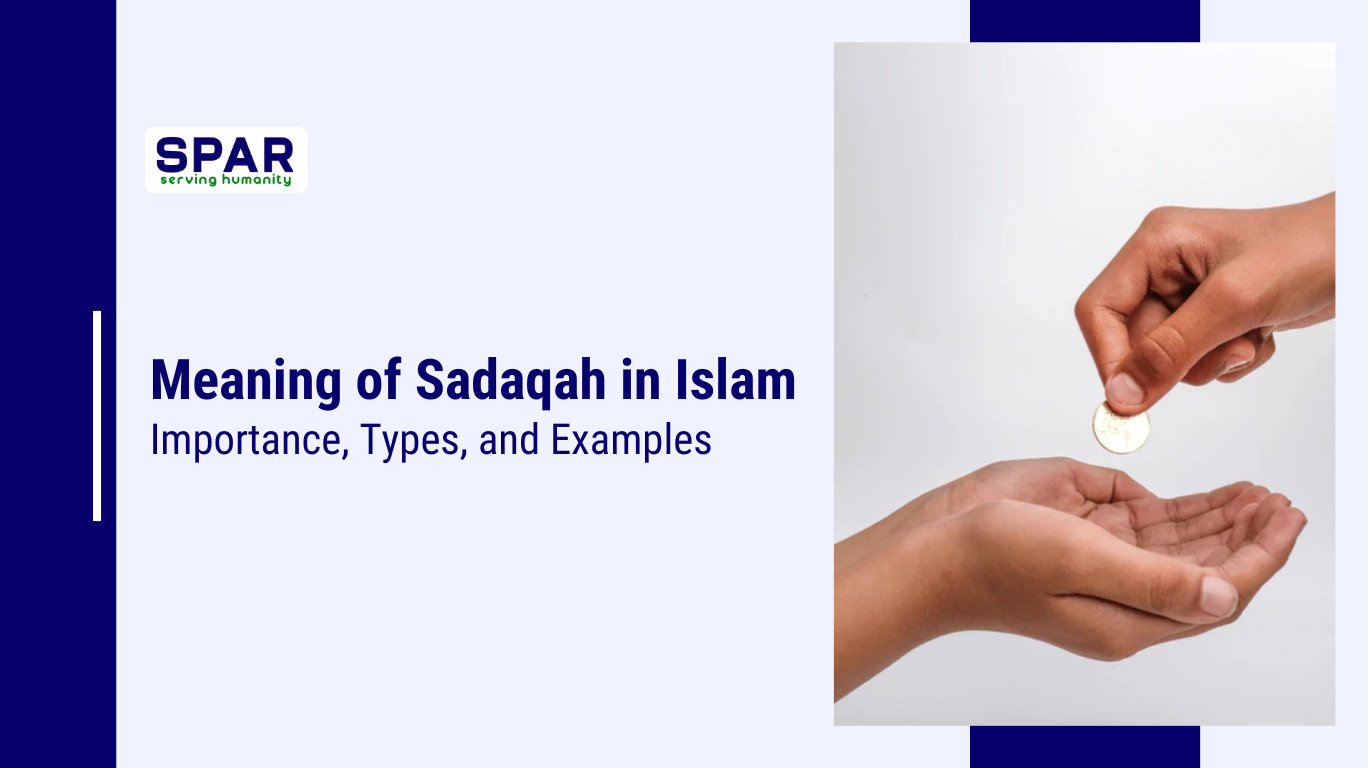Meaning of Sadaqah in Islam: Charity That Brings Rewards
A gracious act of charity, Sadaqah is indeed a beautiful act of charity in Islam. It is more than giving money. It’s about serving others, being kind, and winning the blessings of Allah. In Islamic terms, the literal meaning of Sadaqah is not wealth. It encompasses every charitable deed done for the right reasons in order to help another.
In this guide, we will discuss the meaning of Sadaqah, its types, and the benefits for both the giver and the receiver. We will also discuss easy ways to practice Sadaqah on a daily basis and explain why the rewards never stop coming in this life and the hereafter.
What Is the Meaning of Sadaqah in Islam?
It is important to note that Sadaqah refers to voluntary charity. It is derived from the Arabic word “Sidq,” which means truth and sincerity. Sadaqah—In Islam, Sadaqah is any act of kindness performed with no expectation of anything in return done to please Allah.
The Qur’an Promotes Giving Sadaqah:
The example of those who spend their wealth in the way of Allah is like a seed that grows seven ears; in every ear, there are a hundred grains. (Quran 2:261)
Even small donate give big reap. Sadaqah is a charity that not only lets Muslims share all their blessings with others; it also helps them strengthen their faith.
Why Is Sadaqah Important in Islam?
Importance of Sadaqah: Why is it so Important?
- Cleanses the heart: Charity removes greed and selfishness.
- Having Taqwa: You believe Allah will provide for you.
- Fosters community: Charity supports the less fortunate and binds the community together.
- Bring blessings: Acts of charity attract barakah (blessings) to your life.
Besides these advantages, Sadaqah helps Muslims practice selflessness and gain empathy. It reminds the faithful to focus on the needs of others and the goodness in their own lives.
Types of Sadaqah
1. Monetary Sadaqah
This is donating money to the poor, building mosques, or making charitable gifts to schools and hospitals and monetary Charity. Making monetary charity is one of the easiest and most efficient ways of helping others.
2. Non-Monetary Sadaqah
Things like helping anyone, smiling and teaching are parts of Sadaqah that can be done without the use of any currency. Sadaqah can also be non-monetary, as it enables individuals to participate through their time, skills, and actions.
3. Sadaqah Jariyah
This is a continuous charity that continues to benefit others over time. Such work can include building wells, planting trees, or donating books. This sort of charity guarantees returns for decades or centuries.
4. Sadaqah Through Kind Words
Speaking nice and lifting words can also be a type of Sadaqah. Being a cheerful voice, support, and encouragement can light up someone’s day and come back in return to the giver.
You are echoing the statements of the Qur’an, the teachings of the Prophet (SAW), and the actions of his companions.
5. Examples of Physical Sadaqah
This can be as simple as helping someone carry groceries, fixing something that is broken, or giving someone a ride. These little acts of assistance can go a long way in someone’s life.

Examples of Sadaqah in Daily Life
1. Feeding the Poor
Food is an inexpensive and effective form of Sadaqah you can share with less fortunate people. You can prepare a meal for a neighbour, distribute food packets, or donate to food banks.
2. Helping Someone
It can be in the form of giving someone a ride, helping them with their daily chores, or just being there for someone in distress.
3. Teaching Knowledge
If you teach someone a helpful skill or knowledge in Islam, it will benefit him in his life. Helping a child to read the Quran or providing a skill for work to earn bread.
4. Planting Trees
Trees offer shade, oxygen, and fruit. Most charitable gestures cease to exist sooner than later, but planting them is as permanent as it gets—they help the people and the planet.
5. Smiling at Others
“Allah Messenger (ﷺ) said:
“Your smile at your brother is an act of charity.’ (Tirmidhi)
Hearing thank you or even just a smile with eye contact spreads energy and makes us feel good.
6. Providing Clean Water
This makes it easier to provide clean drinking water, whether by building wells, installing water pumps, or donating filtration systems. It is one of the most potent types of Sadaqah, especially in places where clean water is not available.
7. Supporting Education
Supporting access to education by paying school fees for a poor child, donating books and supplies, and laying the foundation for a better future.
The Difference Between Sadaqah and Zakat
| Aspect | Sadaqah | Zakat |
| Obligation | Voluntary | Compulsory for eligible Muslims |
| Recipients | Anyone in need | Specific groups like the poor or orphans |
| Amount | No fixed amount | 2.5% of yearly savings |
| Purpose | Any act of kindness | Religious duty to purify wealth |
Benefits of Sadaqah
1. Protects Against Hardships
“Charity extinguishes sin as water extinguishes fire,” the Prophet Muhammad (peace be upon him) said. (Tirmidhi)
2. Increases Wealth
Giving does not decrease wealth. Other than that, it will bless and multiply it to become more significant than what actually belongs to you.
3. Builds a Stronger Society
Charity helps needy people, eradicates poverty, and promotes love and unity among mankind.
4. Brings Inner Peace
It gives you happiness, and your heart becomes peace to help other people. The sense of having made a difference for the good can be gratifying.
5. Rewards in the Hereafter
Sadaqah has rewards beyond the grave and is one of the best in continuous charity, such as Sadaqah Jariyah
How to Practice Sadaqah Regularly
- Start Small: A smile, a food donation, or help finding a service. Anything you do will make a difference.
- Be Consistent: Giving should be a habit (daily, weekly, monthly).
- Partner with Trusted Organizations: Collaborate with trusted organisations such as SPAR Bangladesh to ensure the charity reaches the right people.
- Engaging Your Family: Introduce Sadaqah to your children so they can learn about being kind from a young age.
Sadaqah in the Quran and Hadith
From the Quran and Hadith, Sadaqah comes again and again. For example:
- “They give to charity both by night and by day, in secret and in public, shall have their reward with their Lord.” (Quran 2:274)
- The Prophet Muhammad (peace be upon him) said:
“Charity does not diminish wealth. (Muslim)
Hitting us with it again, these teachings don’t just moonwalk away from the rewards or blessings of charity.
Final Thoughts
Sadaqah: In Islam, the term does not solely refer to charitable donations of money. It has to do with being kind, genuine, and helping others the best you can. Giving Sadaqah brings unlimited rewards, enhances your faith, and makes the world a better place for all. Start doing simple acts of kindness today. Even a smile is a Sadaqah; you know that well!
What is Sadaqah in Islam?
Sadaqah refers to a voluntary charity you give in order to seek the blessings of Allah. It can be financial and non-financial acts of kindness.
What is the difference between Sadaqah and Zakat?
Sadaqah is voluntary, whereas Zakat is an obligatory form of worship for qualified Muslims.
Can Sadaqah be given to non-Muslims?
Yes, as long as it is a person who benefits from it, what matters is not the religion of that person.
What are the types of Sadaqah?
This could be feeding the hungry, planting trees, supporting a person, or teaching some helpful knowledge.
What is Sadaqah Jariyah?
Sadaqah Jariyah is considered a type of charity that is ongoing and never stops benefiting people over time, like building a mosque or providing clean water.
How often should I say Sadaqah?
How often can you give Sadaqah? Little, small acts on a regular basis are just as valuable as these types of more considerable donations.
Am I Allowed to Do Sadaqah in the Name of My Loved Ones?
Yes, a Sadaqah can be offered in the name of a dead or a living loved one.




 Secure
donation
Secure
donation